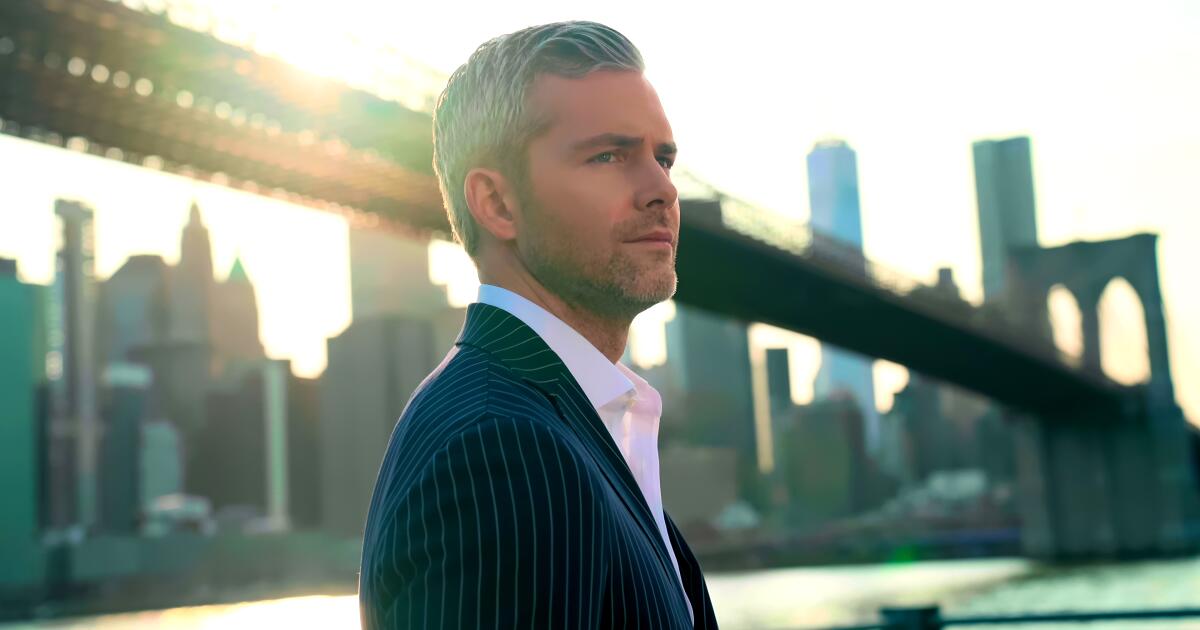
Ryan Serhant doesn’t know selling real estate without a television show.
After a short-lived career as an actor, and just months into his foray in real estate, he was cast in Bravo’s reality series “Million Dollar Listing New York,” a spinoff of its L.A.-based predecessor. The series gave viewers tours inside multimillion-dollar luxury properties while showing the drama among arrogant and wily agents who often competed for listings or sales. It premiered in 2012 and ran for nine seasons — and it helped establish a winning format of high-end real estate voyeurism mashed up with reality TV drama.
From the start, Serhant sought to stand out with an over-the-top, hot-shot salesman style — dressing like Aslan, the lion from “The Chronicles of Narnia,” and jumping into a swimming pool during an open house were among his exploits. Ever the dealmaker, he brokered a number of specials and spinoffs for Bravo, most recently “Ryan’s Renovation” (2021), which chronicled the remodel of the Brooklyn townhouse he shares with his wife and daughter.
In 2020, he started his own real estate brokerage — Serhant. — and once again invited cameras along, but this time for Netflix, which has doubled down on real-estate reality programming with such shows as “Selling Sunset” and “Buying Beverly Hills.” With “Owning Manhattan,” now streaming, cameras follow Serhant and his team of agents as they compete — sometimes with each other — for some of New York’s most sought-after listings.
In a recent video call from New York — as a back-seat passenger readying for his next appointment — Serhant talked about making the jump to Netflix from Bravo, navigating reality TV drama as a boss and why money-strapped viewers can’t get enough luxury real estate porn. This interview has been edited and condensed for clarity.

Harlan Berger, left, is a developer who appears in “Owning Manhattan” with stars Ryan Serhant, Nile Lundgren and Chloe Tucker Caine.
(Netflix)
You have a long history with Bravo. You approached them with the idea of a show when you started your company. What was the feedback and what prompted the jump to Netflix?
When I knew that I was starting my own company, I had a conversation with Bravo and my agents, and they were basically like, “You know how ‘Million Dollar Listing’ is a format? It follows a couple real estate agents as they sell real estate. Imagine ‘Law & Order’ — that’s a format. Imagine, if you turned on an episode of ‘Law & Order’ and then all of a sudden one of the detectives was like, ‘J.K., now I have my own detective agency and that’s what the show is.’” It would be weird for the format. And so we brought the show to an end after they tracked my starting of Serhant., and I immediately put together a presentation of what my next chapter would look like … and presented that to all of the networks. Got offers for most of them. But I know Jenn [Levy] really well at Netflix. [Levy, who had been director of unscripted originals at Bravo, left her post at Netflix earlier this year.]
We went forward with Netflix, and it’s honestly been such a cool experience. It scratches the itch of, “OK, you want to see $250-million New York City penthouses? Here you go, Episode 1. You want to see what it’s like inside the workplace drama of a young startup real estate firm, à la ‘Vanderpump Rules’? OK, here you go. You want to have your own orchestra composing your music that gives you slightly a ‘Succession’ vibe. Yeah, we could do that too. Plus we’re gonna drop drones through the canyons of this city and showcase Manhattan in a way it’s never been shown before. Yeah, we can do that because we’re Netflix. What else do you want to do?” I was like, “I’ve never seen a reality TV show that has a first-person narrator with a voice-over, can I do that?” And they were like, “Yeah.”
You have a background in acting, and you’ve been in the reality space for a while, so you know drama makes good TV. But you take your role as a professional starting a company seriously. How is it to navigate the drama now as a boss?
So stressful. It was a tough one. “Million Dollar Listing” was stressful at the time, but it was really all me. It was on my shoulders, my clients, my business. This time around, I bet my life on starting this business in 2020, and so the exposure is a double-edged sword. With Netflix, part of the deal was, “Here’s the amount of time you’re gonna film for, and we’re gonna film everything, for better and for worse, and we’ll see what happens.” That removes some deal pressure. On “Million Dollar Listing,” it was formatted. So you’re gonna list it, and you would have those 12 listings up on a board for a year, and if they sell, they sell; they don’t sell, you get fired on TV. Because of the shooting window, you couldn’t leave things open-ended. This is different. This season ends on the cliffhanger. Every episode is a cliffhanger. We had an agent, halfway through the season, just up and quit on camera. I had to fire people who are pushing other people to quit. That’s what you get to watch on top of the deals now. The show starts with me and 12 agents, and it ends with 10. I start with salt-and-pepper hair, I end with white hair.
To expand on that, Jonathan Normolle quickly emerged as the so-called villain of the season. From a show perspective, the drama and tension that someone like him brings is appealing. But you, as a boss, decided to fire him. Tell me about the push and pull of keeping the show entertaining and thinking about your company.
There’s reality, and it’s what we do all day — the work, the people, the management, the payroll, the business, the opening of new markets every day— and then there’s perception, which sits on top of reality. What I did with “Million Dollar Listing” was I said, “OK, I have reality of my business. ‘Million Dollar Listing’ is going to be the perception, and it’s going to sit, not on top of reality, but above it. And that’s going to push me to consistently bring reality up to the perception.” Because we would take a year to film “Million Dollar Listing” and it would come out the next year. Whoever I act as, however I talk, the properties I show, that’s who the world is gonna see next year. That’s where a lot of the stress intention lay. Obviously, I want to do the TV show because I’ve only ever done TV shows. I don’t know selling real estate without a television show. I said [to my executive team], “If we’re gonna do this as a company, we have to go all in.” I don’t want anyone watching the show and saying to themselves, “What didn’t they show?” That was the push and pull: Do you really want to show the warts of your business to 270 million people? Or do I look at it not as warts but as I’m young, building my own business and be vulnerable with the world, and you’re going to come on this journey with me.

“Owning Manhattan” stars Savannah Gowarty, Jessica Markowski and Jonathan Frank Normolle, who was let go.
(Netflix)
Have you had any run–ins with Jonathan since?
I give Jonathan a lot of credit. I saw something in him that I also saw in me. I’m not tattooed on my my head, but a little bit of a fish out of water. I had a dream in my head: “Dude, here’s what you should do — people are gonna look at you and they’re gonna judge a book by its cover. You have seconds to change people’s minds. You sell something big, you show them you’re a great, great person who’s also fun and awesome and cool and the face of the next generation, you are gonna have the biggest career ever. Or you could blow it all up.” And so it was probably my biggest disappointment. But I give him credit for being his authentic self.
There are some headline-making deals on “Owning Manhattan.” Tell me about these listings and the struggle of getting high-profile clients to be on camera or not. Bad Bunny winds up renting the Jardim property featured on the show for a record $150,000 per month. The season ends with you nabbing a listing for a condo that was used in “Succession” as Roman Roy’s home.
How random was that ending? Props to our production team for taking the weirdest idea I think I’ve had. I’m like, “You know what we’re going to do? We’re going to end the show in a way where people are gonna be like, ‘What the f— just happened?’” All I think about is: How do I get someone to look up from their damn phone? Anyway, I guess I’ve been used to it now for a long time. But that’s why you see buyers’ representatives, family members or lawyers kind of stepping in for clients here and there. In our show, we see a lot of the real people, a lot of the real developers. The penthouse at Central Park Tower — that’s a long-lead listing. There’s only so many people in the world who can afford it and, so [we say], “We’re gonna put it on a Netflix show. First person who buys it, gets it. Just trust me.”
Harlan [Berger], the seller of the Jardim, where we rented it to Bad Bunny — we sold it, by the way. It just traded after we were done filming for, I think, $15 million. That’s a classic example. The seller agreed [to be on camera], but the tenant [Bad Bunny] did not agree to go on camera. We didn’t mention anyone’s names. It got put into the press, so now it’s part of the public domain; but the press, because that’s a huge rental amount, then helped bring in the buyer. You don’t buy an Hermès bag because it can be your purse. The brand sends a message. Real estate is the same way.

The interior of a Manhattan home from Season 1 of “Owning Manhattan.”
(Netflix)
It’s a complicated time to display some of New York’s most exclusive real estate on a global stage. The cost of living, especially in big cities, is insane. What have you gleaned about why viewers enjoy getting this inside look into the upper echelons?
Because we’re all voyeurs. Everyone wants what they can’t have. Everyone fantasizes. It’s what keeps us going. It’s like brain liquidity, it’s dream liquidity. I watch “Drive to Survive.” I’ll never be behind a wheel in one of those cars, but it’s fun to watch their lives unfold on the racetrack and be like, “Man, they’re taking this seriously.”
How are you feeling about the housing market right now? How much of the sales you are doing these days are with buyers overseas?
The most interesting stat for me is that pre-COVID, I was doing 35% of all our transactions in cash. Today, it’s like 75%. The market right now is educated — it’s not exuberant, and it’s not devastated, it’s educated. International purchasers, we’re doing a lot with. I just sold a house — we sold it to a Croatian over FaceTime. Before that, I sold a house for $57 million over FaceTime to someone in South Africa.
[International sales are] a big part of our business and a big part of me also signing up with Netflix. I called five of my clients who are overseas, and I was like, “OK: Netflix, Amazon, Peacock, Hulu. Which one do you have?” And the common denominator across all of them was Netflix. I was like, “OK, for business, this is a mutually beneficial relationship, so we’ll pick the biggest network.”
